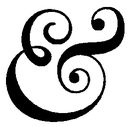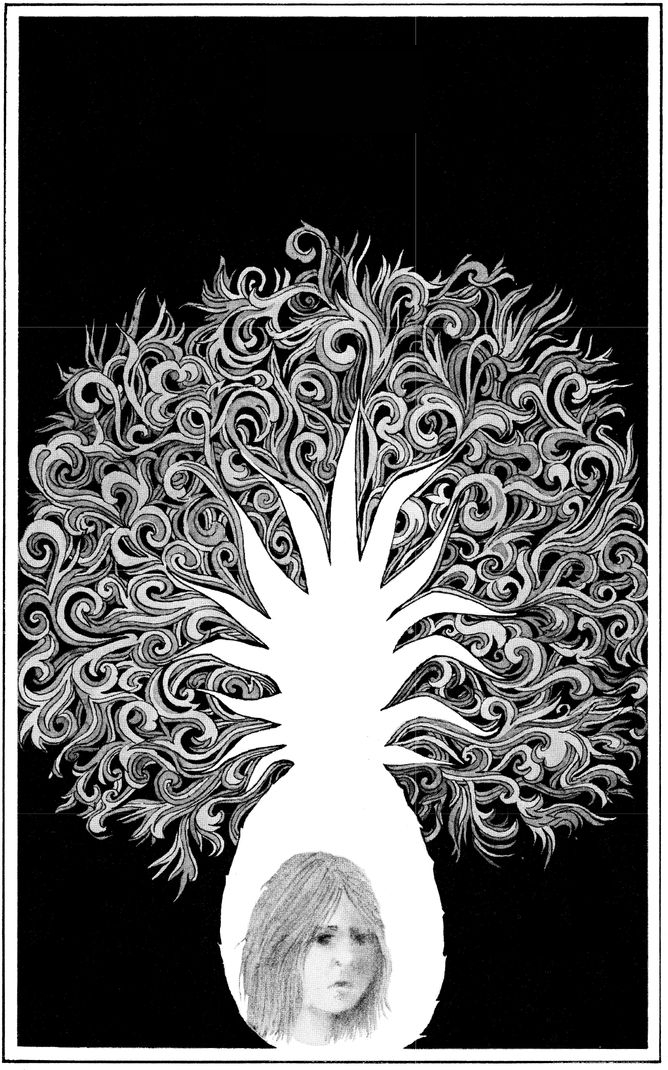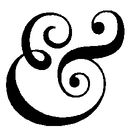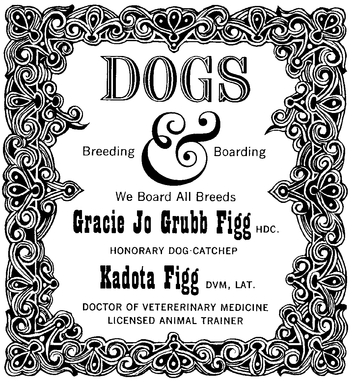Figgs & Phantoms (6 page)
Authors: Ellen Raskin

“How can you get those papers if Mr. Bargain is the only one in town who subscribes to them?”
“You, Fido Figg, are going to steal them!”
“I will not. Honestly, Mona, for someone who hates dirty books....”
“Old man Bargain swears at me, so it's all right.”
“It's not all right. If you want to steal them, go ahead; but not me. And how is Uncle Florence going to travel two hundred miles? He doesn't drive, and your folks work Saturdays.”
“You'll have to ask your father to drive us.”
“Let's get this straight, Mona,” Fido said after a long sniff. “I'll paint the bus; I'll pay for half the paint, but the rest is up to you. Good-bye, I'm late for practice.”

4. THE POTATO DANCE
H
ow DID your homework go?” Florence asked at the dinner table.
ow DID your homework go?” Florence asked at the dinner table.
“Terrible,” Mona replied, remembering that her composition was overdue. If her plan kept to schedule, she could return to school in time to hand it in, but she had to write it first. “Just terrible.”
“That's not like you, princess,” Newt said as Sissie carried in a flat cake, tapping and singing “School Days.” “You're always so good in school. Not like us, huh, Sis?” Newt chuckled over sweet memories.
“Being good in school isn't everything, Mona,” Sissie said. “I wish you'd let me teach you baton-twirling. Or at least some of the cheers.”
“Your mom was the best cheerleader Pineapple High ever had,” Newt said proudly.
Sister demonstrated her favorite. “With an N. With an E. With a W, T. Newwwwwwwt!”
Unimpressed, Mona left the table and returned with her notebook.
“Why don't you read your composition out loud. Perhaps we can help you,” Uncle Florence said, as she had expected.
“The assignment is to describe an imaginary person in five hundred words,” Mona explained, then read what she had written:
“His name was Holtzlump. Conrad Q. Holtzlump, to be exact. The people of Winston-Salem wondered what the Q. stood for. They knew so little about this strange man, who had a nose like a potato and moved like a trombone.”
“We too,” Sissie said approvingly. “What does the Q. stand for, I wonder. And how did you ever think up a name like Holtzlump?”
“I'm more concerned with Winston-Salem,” Newt said. “You haven't taken up smoking, have you?”
Mona's answer was a wilting glare.
“That's quite good, Mona,” Florence said. “Go on.”
“That's all I have,” Mona confessed. “I can't figure out what kind of a person moves like a trombone.”
“Then why did you write it?” Newt asked.
“I like the way it sounds,” Mona replied. “Sort of intriguing.”
“Your Uncle Truman looks something like a trombone when he's doing his human-pretzel act,” Sissie said.
Newt corrected her. “You're thinking of a French horn.”
“Well, change it to French horn and write about Truman,” Sissie suggested.
“It's supposed to be an imaginary person,” Mona replied impatiently. “Besides, who wants to write five hundred words about a double-jointed idiot who bites his toenails? ”
“Mona Lisa Newton, what a thing to say about your Uncle Truman!” Sissie scolded.
“Well, it's just what all the people of Pineapple say about him,” Mona replied calmly.
“What people?” Newt was aghast. “I don't know anyone who'd say such a thing.”
“Never mind.” Mona couldn't explain how she knew what everybody said. She just knew.
Worry creased Uncle Florence's face. “Let's get back to your composition. As you say, it is supposed to be an imaginary character.”
“I know!” Sissie exclaimed. “Just turn it around, Mona. Make him have a nose like a trombone and move like a potato.”
“Move like a potato!” Newt howled.
Sissie giggled uncontrollably. Uncle Florence smiled broadly. Someone repeated “potato” and all three roared with contagious laughter.
Then four.
“Look,” Newt gasped, pointing at his daughter. “Look, Mona's laughing!”
Mona stopped laughing.
The others stopped laughing, cleared their throats, and returned to the business at hand.
“I have an idea,” Florence said. “Your paragraph is too good to waste. Why don't you put it aside and start again with something you do know? Describe the Figg-Newton giant.”
Mona argued that the giant wasn't imaginary, but her uncle explained that although they were each half of the giant, the giant itself was not real.
Mona wasn't sure, but the giant would be simple enough for her to describe: its clothes (which she had sewn), its face (Kadota plus pimples), its arm movements (like a windmill, like a bird).
“Thanks, Uncle Florence.” Mona wrapped her arms around her uncle and planted a big kiss on his cheek. Then, turning her back on her parents, she clumped up the stairs to her room.
Newt and Sissie stared sadly after their daughter, stung by the deliberate rejection. At last Sissie rose from the table.
“Moved like a potato,” she said, trying to sound cheerful.
Newt forced a loud laugh at Sissie's attempt to imitate a potato dancing. “Hey, Sissie, that's good. That's really very good.” His voice broke.
Mona, Mona, Uncle Florence thought. Perhaps it's all for the best that I go to Capri.
III


1. THE THIEF
S
TOP THAT MAN! Stop him!”
TOP THAT MAN! Stop him!”
Newt stopped jogging and looked around. “Who, me?” Ebenezer Bargain was pointing a spidery finger at him.
“Shame on you, Newton Newton,” Mrs. Lumpholtz snapped. “Stealing an old man's mail.”
“What arc you talking about, Alma? I didn't steal any mail.” Newt vindicated himself by opening the burlap bag he had been carrying over his shoulder for the inspection of the crowd. “Just car paint, see? And here's the receipt.”
The commotion on Hemlock Street came at a propitious time for Mona, who was hurriedly shuffling through Bargain's mail behind a trash can in the alley. There were no obituaries of book collectors in the newspapers, but she made a more fortunate discovery.
Mrs. Lumpholtz was now accusing Flabby Benckendorf of the theft. The druggist was proclaiming his innocence, and a third voice (a voice remarkably like Uncle Florence's) was appealing to all parties for reason.
Mona stuffed a catalogue in her jacket pocket, opened the back window of the shop, and tossed the rest of the mail and papers onto the top of Ebenezer Bargain's high desk. Her timing was perfect. When she reached the corner the blue town bus was waiting with open doors.
Slumped in a rear seat, Mona studied Saturday's auction catalogue to the end of the line, She then walked the two blocks to the kennels.

“Kadota, go see what's disturbing the dogs.” Gracie Jo had her hands full bathing three mongrels in the kitchen sink.
“Down, Mutt; down, Jeff; come here, Boy.” Kadota dispersed the dogs one by one until he found Mona at the bottom of the pack. “Everything's all right, Gracie Jo,” he called, “it's only Mona., smelling of her cat.”
Â
â
“Dogs!” the people of Pineapple said. “Funny how they've always taken to Gracie Jo. And not only dogs. Once when the circus came to town two elephants and three white horses followed her all the way home. Small wonder she fell in love with that Figg of an animal-trainer. Some doctor he is, with his mail-order degree. Every animal Kadota treats ends up shaking hands. That's all right for dogs, but who wants to shake hands with a cow?”
“Dogs!” the people of Pineapple said. “Funny how they've always taken to Gracie Jo. And not only dogs. Once when the circus came to town two elephants and three white horses followed her all the way home. Small wonder she fell in love with that Figg of an animal-trainer. Some doctor he is, with his mail-order degree. Every animal Kadota treats ends up shaking hands. That's all right for dogs, but who wants to shake hands with a cow?”
Â
The honorary dog-catcher appeared at the screen door carrying the wet pets. “You okay, Mona? Why aren't you in school?”
“I'm just fine, Auntie Gracie Jo,” Mona said, picking herself up. “I hope I didn't frighten the animals.”
Mona, the model of politeness, ingratiated herself by shaking hands with the yelping dogs. Trying to ignore the rooster that had lighted on her head and the Dalmatian nudging her in the rear, she pleaded her cause. “Fido and I have a plan for Uncle Florence's birthday, and we need your help.”
“Fido” was the magic word. Not only did Kadota agree to her requests; he even drove her back to the used-car lot.

Mona brushed off the telltale dog hairs, took a deep breath, and prayed that some of the family show-business blood would course through her veins.
“Uncle Florence, look what I've found,” she shouted as she leaped up the steps of the Fabulous Figgs bus waving the catalogue.
“What's all the excitement?” Florence asked, surprised by her rare exuberance. Mona shoved the open catalogue into his gnarled hands.
| Sale 924. Saturday, at 10 A.M. | 12 |
| 34 | [CLEMENS, SAMUEL L.]. Adventures of Huckleberry Finn. New York, 1885. |
| 4to. FIRST AMERICAN EDITION, early issue with “was” for “saw” p. 57, line 23; frontispiece in first state. Original cloth, some wear near top of spine. BAL 2415. | |
| 35 | COLERIDGE, S. T. The Rime of the Ancient Mariner. London, Ballantyne Press, 1899. |
| 12mo. Woodcut initials on opening page. Green morocco, inlaid and gilt design on upper cover, t.e.g., uncut, by Riviere. | |
| 36 | CONRAD, JOSEPH. The Secret Agent. A simple tale. London, 1907. |
| FIRST EDITION. 12mo, original red cloth, with the 40 p. of ads at end dated “September, 1907”. Keating 73. | |
| 37 | CONRAD, JOSEPH. Youth. A narrative and two other stories. Edinburgh and London, 1902. |
| FIRST EDITION. 12mo, original pale green cloth. With the 32 p. ads dated “10/02”. Contains “Heart of Darkness”. Keating 34, |
Other books
Hailey's War by Jodi Compton
Accidental Heartbreak (The Accidental Series, Book 2) by Tina Martin
The Color of Greed (Raja Williams 1) by Thompson, Jack
Inside the Head of Bruno Schulz by Maxim Biller
Lives in Ruins by Marilyn Johnson
Complete Sherlock Holmes, Volume II (Barnes & Noble Classics Series) by Sir Arthur Conan Doyle
Muriel Pulls It Off by Susanna Johnston
Mexican Heat (Nick Woods Book 2) by Stan R. Mitchell
Slated by Teri Terry
Clementine Rose and the Pet Day Disaster 2 by Jacqueline Harvey